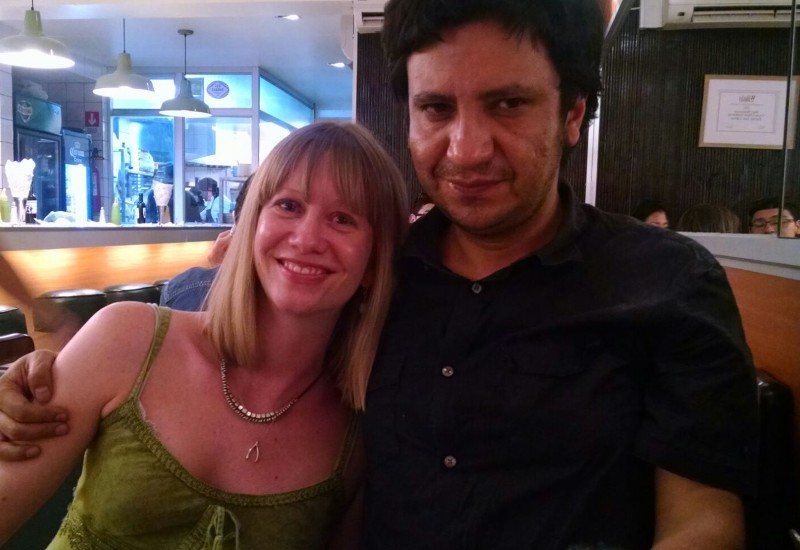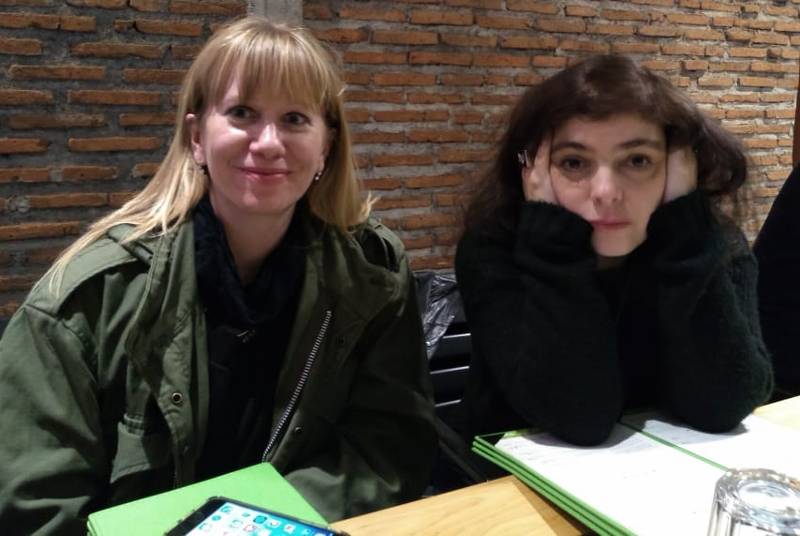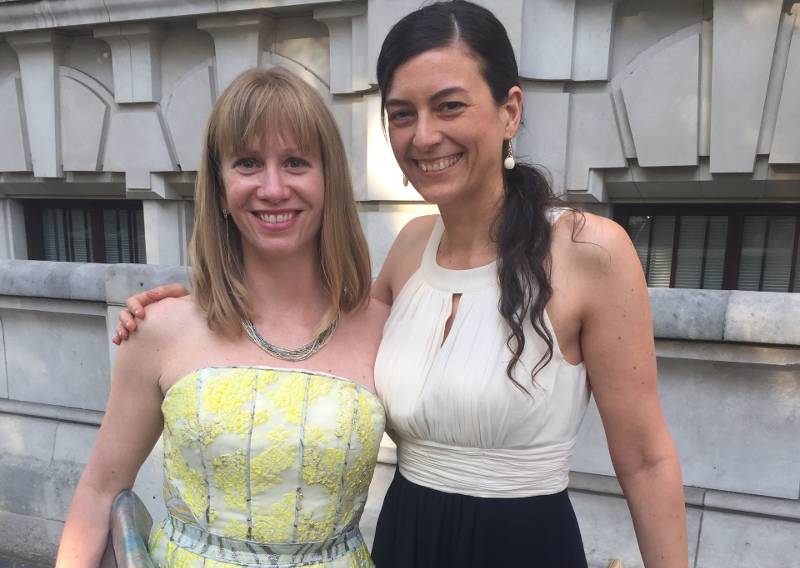With dozens of books under her belt, Megan McDowell is a prolific translator who has ushered many of today’s best-known Latin American authors (including Alejandro Zambra, Mariana Enriquez, Lina Meruane, Carlos Fonseca, and Samanta Schweblin, among others) into English. Many of these writers know Megan as a friend as well as a translator—a friend who closely observes the composition of their original texts, then recreates them in English over the course of conversations, learning to think and write like the authors she translates. 2022 will see the publication of two big projects from Megan, in terms of both scale and impact: Alejandro Zambra’s Chilean Poet, available now from Viking, and Mariana Enriquez’s Nuestra parte de noche, monumental translations she completed simultaneously during the Covid-19 pandemic. Megan and I talked via email about her evolution as a translator, dealing with diverse authorial voices, and the growing conversation around recognizing translators as crucial players in the literary landscape:
Denise Kripper: Your translation of Chilean writer Alejandro Zambra’s new novel Chilean Poet is now out from Penguin Random House, congratulations! You’ve translated many of Zambra’s books over the years—how has that process evolved over time?
Megan McDowell: Yes, I definitely feel like my career has gone in parallel with Alejandro’s, in a way we’ve made this journey together. Along the way he has also become one of my most treasured friends and a person I admire terribly. Translating Alejandro’s work is a kind of home for me. I know his voice/es, I often know his references and concerns, and his games with words and narrative are ones I enjoy playing and learning from as well. I think Alejandro and I are very well-matched in terms of how we work—we’re both obsessive, we both question everything and nitpick and fine-tune a text, we never really feel like it’s finished. Also, I think starting with Facsimil, I’ve read drafts of Alejandro’s books and stories and commented on them—I’m among the group of people he workshops his texts with, which is something I value enormously. So, I’m involved in the writing process and he’s involved in the translation process, and the whole thing is about as collaborative as it can be.
DK: One of my favorite characters in Zambra’s new novel is Pru, an American journalist researching Chile’s poetry tradition. Her Spanish is not great, and a lot of misunderstandings and mistranslations ensue. How do you highlight these linguistic differences between Spanish and English when you’re working in English alone?
MMD: I agree, I love the character of Pru and the perspective she brings to the novel. I definitely relate to her—a lot of her experiences in Chile are ones I’ve had as well. Her experience learning Spanish is particularly relatable—I started learning as an adult, and I’ll still be learning when I die. I know how when you’re learning a language you feel such a sense of accomplishment when you communicate basic things, it’s like you go back to being a child and you’re learning the names for things all over again. Still, sometimes you just want to turn off all the languages and be silent.
There were certain things we did to highlight the linguistic differences—in general, it was necessary to talk about Spanish in the translation. The word “padrastro” is important to the plot and the ideas of family that drive the novel, and that word has different connotations from the word “stepfather”—it basically means “bad father.” I had to talk about that specifically Spanish meaning. Sometimes I had to specify when someone was speaking Spanish or English, and I had to emphasize how Pru has trouble with the genders of words. That comes to bear in Vicente’s final poem, which he writes for Pru and which plays with the idea of gendered words. That poem is one of the more difficult translation “problems” I’ve ever had to solve.
I think that because this book is so concerned with “Chileanness,” it was necessary to have Pru as an interlocutor who was actively engaging in an exploration of what “Chilean” even means, from the perspective of an outsider. People love to explain their culture to foreigners, and you can learn a lot about them personally as they do. The interviews and conversations Pru has with Chilean poets are a great device for developing the characters themselves as well as concepts of nationality and family. In the end, though, I relate to Pru because she and I are both Chilean poets, even though we’re neither Chilean nor poets.

Megan McDowell with Alejandro Zambra in Santiago de Chile. Photo: Jim Culross.
DK: Another translation by you being published soon is Chilean author Juan Emar’s Yesterday (New Directions, April 2022), of which we’re including an exclusive preview in this LALT issue. This project seems very different from all the other many works you have translated, most notably because the author is dead. Could you share with us a bit more about this project and how it came to be?
MMD: Yes indeed, this is a project that’s very near and dear to my heart. I actually started working on Juan Emar and Alejandro at around the same time, when I was in my master’s program and taking translation workshops. I’d first been introduced to Emar when I was living in Chile, when an ex-boyfriend would read aloud to me from Ayer and from Miltín 1934. He was a good, enthusiastic reader, and while I didn’t understand everything I was carried along by the rhythm of the prose, and I could tell it was funny, full of unexpected turns. So I chose it as my project in a workshop, not really knowing what I was getting myself into, and I kept working on it afterwards, for years, intermittently. I’ve been through several editing processes with it, most recently with Pereine in the UK and New Directions in the US. Basically, my experience with Yesterday has spanned the entirety of my career as a translator, and the translation has evolved as I have. I think I could work on this book my whole life and never be fully satisfied with it.
Emar is a madcap and very serious writer who was close to the French surrealists, but who really isn’t much like anyone else, you can’t fit him in a box. He’s certainly not like any other writer from the Latin American canon, and maybe that’s why he’s been so unfairly ignored, but at the same time his references are very Chilean. I think that maybe today English-speaking readers have an expanding idea of what Latin American literature is and can be, and now they’ll be open to loving this crazy writer who was so ahead of his time.
DK: Most of the authors you’ve translated are very much alive and publishing often (Lina Meruane, Carlos Fonseca, Mariana Enriquez, Samantha Schweblin, and others). They are very prolific, and their books are released in translation fairly quickly in an industry that, as we know, is not that welcoming of translations (especially of short story collections, for example). Is there a tacit understanding that you will continue translating these authors? Does this leave time to work on other translation projects close to your heart? Given your status, do presses now approach you or do you still find yourself having to pitch them ideas? What un- or under-translated author would you want to translate?
MMD: It’s not tacit! They better not use another translator. I kid, of course. But it’s true, I do try to stick with my writers over time. For me this is a relationship, we get to know each other: I learn how my writers think and I learn their styles, and they (hopefully) learn to trust me. All those things contribute to a good translation. Also, all the projects I work on are close to my heart—I wouldn’t do them otherwise! I just feel so lucky to work on the books that I have.
But it’s also true that I can’t do everything I want to, and I’ve had to make some tough decisions. I would very much like to pitch more books, both by contemporary writers and by past authors who have been overlooked and are just waiting to be rediscovered, like Emar. I also have students on occasion, and I help them find projects. I facilitated my student Jacob Edelstein, who has worked on some stories by Daniela Catrileo, a fantastic Chilean Mapuche poet/writer. That’s an example of a project I would have liked to have done but just couldn’t, but luckily it’s still getting out there.
DK: I love the idea of learning to think and write like the authors you translate because, at the same time, it’s you who’s actively creating their styles in English. Each of your authors has a very specific voice, both in their Spanish and in your English. Could you elaborate on the experience of working with, and having, such diverse authorial voices in your head?
MMD: It is a little schizophrenic, sometimes! It’s true, my writers do all have very different and distinct voices, but I think they all have something that draws me in at a visceral level. Like when I read them, I feel a physical reaction. So as the book “passes through” me into English, that visceral experience is what I’m trying to recreate. A mood, maybe, a style, yes.

Megan McDowell and Mariana Enriquez in Chile. Photo from the personal archive of Megan McDowell.
As a reader, there’s so much that I admire about my writers. With Mariana, it’s about creating a sensory feeling of darkness. A lot of her fiction brings in sounds (the squelching of little running feet), smell (rotting meat in a cabinet), touch (dried-up eyelids like insects), and my job is to tease those sensory details out, make the reader really feel them. With Lina, there’s a lot of playing with the sounds and rhythms of the language—Nervous System is a beautiful, linguistically intricate book that required me to play with English in a more associative way. Samanta’s stories involve just the right amount of ambiguity and uncertainty, but her prose is precise, like a flashlight showing you exactly what she wants you to know and then letting you fill in the dark spaces. As a translator, you have to be precise as well, and never give in to the temptation to explain. Carlos, on the other hand, is an expansive writer, he wants to encompass all of history in his writing and he’s incredibly ambitious. Translating his books is like solving a puzzle, tracing the through lines that connect all the pieces.
I usually focus on one book at a time, or maybe I’m translating one and editing another, but things were a little different the past two years. At the onset of the pandemic, I had just started working on two long books: Mariana’s Nuestra parte de noche, and Alejandro’s Poeta chileno. I spent many long hours locked in with those books, and though there was a lot of anxiety and uncertainty that cut down on creative productivity, I still think if it hadn’t been for the pandemic, I wouldn’t have been able to do those books, not at the same time. They wouldn’t have fit in my head. As it was, they were an escape, they kept me company: I had two other, very different worlds to live inside during a time when my own world was so uncertain and lonely.
DK: Spearheaded by an open letter written by Jennifer Croft and Mark Haddon, there has been a lot of debate recently about crediting translators by name on the cover of the books they translate. What has your experience been like so far in this regard? What is the role authors can, or should, play in recognizing the labor of translators?
MMD: There’s so much to say about this topic, but I love that it’s in the conversation at all—thank you Jenny and Mark!
I’ll admit that at first I was one of the people who had somewhat mixed feelings about translators on the cover. I thought I didn’t mind staying in the margins. In the past, I’ve always been very appreciative when publishers (usually independents) put my name on the cover, but I’ve also understood when they (usually big publishers) don’t, because the cover is there to sell/promote the book, and my name doesn’t sell books. That was how I thought about it. And editors appeal to our high hopes for the book’s success: English-speakers don’t like translation, they say, so if they see a “translated by” on the cover then they won’t buy the book. To put that another way, our recognition is detrimental to the book’s success—no translator wants that! Better to hide my name!
I thought it was more important for the treatment of translators to improve: translators should get paid decently and they should get royalties. But obviously, the name on the cover is the symbol of everything else, and if there is recognition then the rest will follow. It’s a hard thing to do, this saying “I deserve more,” especially if you don’t have a lot of leverage to begin with. That’s why it is so important that authors are starting to pay attention to this issue. Alejandro has been very active in this respect—he signed the petition, but he also proactively took up the cause. He talked to our editors at Viking and said he wanted my name on Chilean Poet as well as on the new editions of his backlist that will be coming out. He talked to his agent and asked for all his contracts to stipulate having the translator’s name on the cover, not just in English but for all his translations.
The name on the cover is a distillation of everything else, a symbol of professionalization. Because basically, translators are thought of as amateurs, hobbyists, people who do it for our love of literature, and while that love is real, we’re also real people who need remuneration and the respect of our peers for the thing we dedicate our lives to.

Megan McDowell and Samanta Schweblin at an event for the 2017 Man Booker International Prize, for which McDowell’s translation of Schweblin’s Fever Dream was shortlisted. Photo from the personal archive of Megan McDowell.
DK: Another interesting issue that came out of that letter was the sense of community among writers, translators, and other people involved in the literary industry. It’s commonplace to describe translation as a solitary profession, but there’s so many people involved in a single translation project. Translators also have networks of colleagues and professional support they can turn to as well. Do you have translator friends you reach out to with questions, or maybe workshop your translations with? Who are some translators whose work you admire or learn from by reading their translations?
MMD: One of the negatives of living in Chile is that I can’t be active in ALTA. I went to the conferences early on and I would love to still go, but it’s a very long trip. Here in Chile one of my best friends is a translator from English to Spanish (and also a really good writer), Rodrigo Olavarría, and we ask each other translation questions pretty much constantly.
I’ve also been lucky enough to work with some excellent editors. The editing process is very important to me and I learn a lot from it. It helps me see how a text is read by an active reader, and my translations always change a great deal in the process.
In terms of other English language translators, Gregory Rabassa is my holy grail. Often as I’m translating I ask myself the question “What would Rabassa do?” (WWRD) Also, when I was working on my master’s degree, I read all of Natasha Wimmer’s translations and the Spanish originals, and I learned so much from that.
DK: What advice would you give someone interested in starting out as a literary translator?
MMD: If you’re not independently wealthy, find a sugar daddy/mama.
Also, find a mentor, but don’t let them be the same person.
Have tough skin—you will get rejected.
Learn time management.
Translate writers who surprise you.
Pay attention to the little words.
Nothing is really all that sacred, and don’t take yourself too seriously.
Read out loud.
Trust yourself but question everything.
No text is ever really finished.


